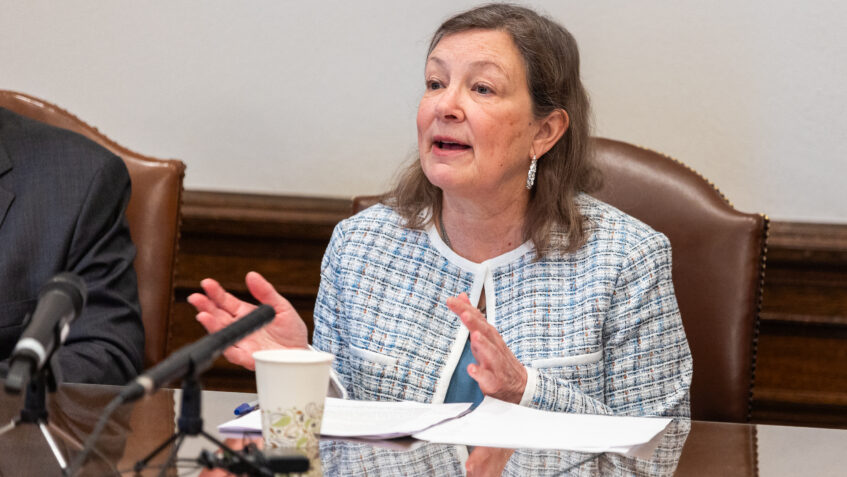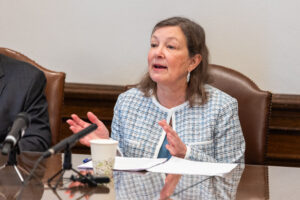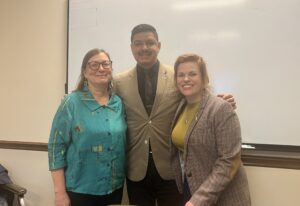Dear friends and neighbors,
We’re almost in the final month of the 2025 legislative session! I have spent the last 11 weeks working hard to deliver real results for our district and state, especially through the Senate operating budget proposal. Unveiled earlier this week, our budget is a balanced, sustainable plan that meets the moment and invests in Washington’s future.
BALANCING THE BUDGET
Budgets reflect our values, and this year, we faced incredibly tough decisions. In past e-newsletters, I’ve discussed the deficit confronting our state, how we got here, and the path forward. As chair of the Senate Ways & Means Committee and lead budget writer, my priority is to close that gap in a responsible way without abandoning the services people rely on.
This proposal protects health care, housing, and food assistance by maintaining funding levels for key programs, ensuring families across Washington continue to get the support they need. It also invests $750 million per year in K-12 education, most heavily on special education and school operations, so students and educators have the resources needed to succeed.
At the same time, we took a close look at where we could reduce spending responsibly. Washingtonians asked us to find savings, and we listened. We identified $6.5 billion in reductions over four years, making tough choices while working to limit harm as much as possible. But an all-cuts approach would have been absolutely devastating, putting schools and supports at serious risk. That’s why we paired these reductions with new, progressive revenue options to keep essential services strong without shifting the burden onto working families.
This budget cuts the state sales tax from 6.5% to 6%, putting money back in the pockets of Washingtonians. It also provides property tax relief for low-income seniors and veterans with disabilities and makes responsible updates to our antiquated and upside-down tax code to support continued economic stability and public investment in our communities.
For too long, we’ve treated our operating, capital, and transportation budgets as separate, even though the challenges we face are interconnected. This budget takes a more coordinated, reimagined approach, allowing us to invest in infrastructure, support long-term capital investments, and meet other pressing needs in a way that makes sense for our state.
We built this budget with Washington’s future in mind, protecting core services, keeping our state financially strong, and ensuring we don’t pass today’s challenges on to future generations.
The budget has already been heard in Ways & Means and voted out of the committee. The full Senate will vote on our plan tomorrow — you can watch the floor debate live on TVW.org starting at 9:30 a.m. Once it advances, we will then begin negotiations with our House counterparts to come to an agreement on a final version, which must pass both chambers by session’s end on April 27. To become law, it will need the governor’s signature.
The full proposal is available here.
THANK YOU FOR JOINING US
Thank you to everyone who participated in our telephone town hall last week! Reps. Mary Fosse and Julio Cortes and I truly appreciated you taking the time to listen and ask questions. We discussed everything from the status of our state budget and the need for increased education funding to our efforts to improve access to high-quality health care and affordable housing.
If you weren’t able to join us or we didn’t get to your question, please contact our office at June.Robinson@leg.wa.gov. You can also listen to the town hall here.
WHAT WE’RE HEARING FROM YOU
Many of you have shared your thoughts on Senate Bill 5041, which addresses unemployment insurance benefits for striking workers. The bill passed the Senate on March 7, moving to the House, where it just passed out of the Labor & Workforce Standards Committee on March 21.
If enacted, this bill would allow striking workers to receive unemployment benefits after two weeks on strike. To put this in perspective, only seven strikes in the past decade would have qualified. Strikes are always a last resort — workers don’t strike to collect unemployment benefits. In states with similar laws, there’s no evidence that access to these benefits leads to more strikes. However, when workers have support, employers may be more inclined to negotiate fairly, potentially reducing the need for strikes.
I want to assure you your voices are being heard. The bill, which I supported in the Senate, was amended to limit unemployment benefits for striking workers to a maximum of 12 weeks. It also includes a 10-year sunset clause, meaning it will be reevaluated to assess its impact over time.
A fair and just workplace benefits everyone, and collective action remains a powerful tool for progress. As the bill keeps moving through the process, I hope you’ll continue to share your thoughts, as well as on other topics that matter to you.
STAY IN TOUCH
Staying connected with the people I represent is one of the most important parts of this job. Your insights and feedback help shape the work we do in Olympia, and I value the conversations we have — whether it’s over email, on the phone, or in person. I encourage you to keep reaching out, following along for updates, and staying engaged.
Sincerely,




